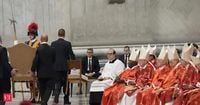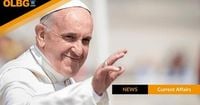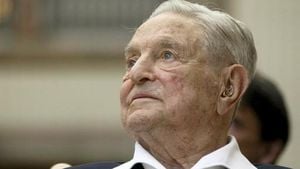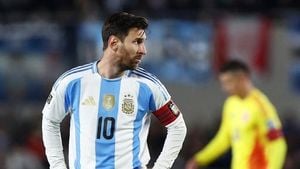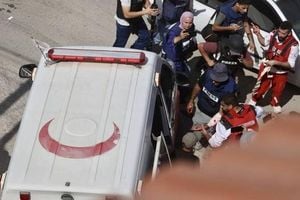As the Vatican prepares for a historic conclave, Cardinal Pietro Parolin has emerged as the leading candidate to succeed Pope Francis, despite a controversial past that raises eyebrows among some Catholics. Parolin, who has served as the Vatican's Secretary of State, is seen as a moderate diplomat with a decade of experience navigating the complexities of Church politics.
His rise to the forefront of the papal race is particularly striking given his involvement in a secret agreement with China regarding the appointment of Catholic bishops. This deal, signed in 2018 and extended multiple times, has allowed Chinese officials a say in the selection of bishops, which critics claim undermines the sovereignty of the Vatican and compromises the faith of Catholics loyal to Rome.
Despite the backlash, Parolin's support among cardinals appears to be solid. "It's Parolin, Parolin, Parolin if I had to risk everything on red," a Vatican insider told The Telegraph. His reputation as a kind and amiable diplomat has won him allies, as many cardinals appreciate his ability to navigate the delicate balance between conservative and progressive factions within the Church.
Cardinals are set to cast their votes in the conclave's first round on May 7, 2025, with Parolin leading the betting odds at 12/5, according to William Hill. His closest competitor, Filipino Cardinal Luis Antonio Tagle, has seen his odds drift from 2/1 to 11/4, while Matteo Zuppi stands at 4/1 and Peter Turkson at 5/1.
Parolin's past includes not only the controversial China agreement but also a botched Vatican project that cost millions, involving the purchase of a former Harrods showroom in London. He has also faced accusations of concealing documents related to sexual abuse cases within the Church. These issues have not deterred his supporters, who argue that his diplomatic skills and moderate stance make him the best candidate to heal divisions within the Church.
One cardinal from the Curia remarked, "He is trusted by the Americans. As a moderate, he can reassure conservatives about upholding church traditions while promising progressives that he won't reverse Pope Francis's initiatives." This balancing act is crucial in a conclave that reflects the geographical diversity of the Catholic Church, with cardinals from over 70 countries participating.
The conclave is notable not only for its size but also for the unpredictable nature of the voting process. With 133 cardinal electors entering the Sistine Chapel on May 8, 2025, the atmosphere is charged with tension and uncertainty. Many of the cardinals feel the weight of their decision, as they must select a leader with moral integrity amidst a backdrop of intense scrutiny and digital-age challenges.
In recent history, the period between a pope's death and the conclave has often been marred by mud-slinging and rivalry among supporters of various candidates. However, the current situation is unprecedented, with damaging online stories surfacing daily, complicating the decision-making process for the electors.
As the conclave approaches, Parolin's supporters claim he has secured between 40 to 50 of the 89 votes required for election, positioning him as a frontrunner. His ability to connect with fellow cardinals and his reputation as a diplomat may ultimately prove decisive in a conclave that many view as a turning point for the Church.
Cardinal Parolin's potential election would mark a significant shift, bringing the papacy back to Italy after nearly 50 years of foreign leaders. His election would not only signify a return to traditional leadership but also a chance to mend the rifts caused by the previous papacy.
As the world watches closely, the question remains: Can Cardinal Parolin navigate the complexities of modern Church leadership while addressing the concerns of a divided flock? The conclave's outcome may redefine the Catholic Church's future in an era marked by rapid change and increasing scrutiny.
The stakes are high, and the eyes of believers around the globe are fixed on the Vatican as the cardinals prepare to make a choice that will shape the Church for years to come.
